29 May 2024
Two vaccines have now been approved for emergency use in the Netherlands and an academic believes the rollout there will have a crucial influence on the scale of any new outbreak here.

Image: © Rokfeler / Adobe Stock
Prompt vaccine deployment in Europe represents the “best chance” of minimising the impact of a further bluetongue outbreak in Britain, a vet and academic has warned.
A second jab against the BTV-3 strain of the virus has been granted emergency approval in the Netherlands and developers expect it will be available for use there imminently.
But although they are unlikely to be available to UK clinicians for some time, the latest Agriculture and Horticulture Development Board webinar on the virus on 15 May was told their rollout will be crucial here, too.
Rachael Tarlinton, associate professor of veterinary virology at the University of Nottingham School of Veterinary Medicine and Science, said: “That is the best chance to keep the outbreak small and that’s really critical right now.”
The comments followed the recent publication of a new APHA assessment, which suggested a “very high” risk existed of the virus being reintroduced to Britain by infected midges blown across from the continent.
A total of 126 animals in southern and eastern England – mostly cattle – were confirmed to have contracted the BTV-3 strain between mid-November and early March, although no new infections have yet been reported since the end of the seasonally low vector period last month.
However, the virus has already taken a particularly severe toll in the Netherlands, where more than 6,000 cases have been recorded since last September.
Mark van der Heijden, a ruminant vet at the Utrecht University’s farm animal practice, told the session that mortality rates for many herds and flocks there had been between 70% and 80%.
He also outlined many of the clinical signs he and colleagues had seen during the crisis, including what he described as “horrible” effects on infected animals’ claws.
But he confirmed that work was already underway to vaccinate sheep, with the effort set to be extended to cattle soon.
Authorities in the Netherlands granted an emergency use licence for a vaccine developed by the Spanish company Syva Laboratories last month.
The latest vaccine to be granted an emergency use licence there has been developed by Boehringer Ingelheim and product manufacturer Bioveta. Gerald Behrens, Boehringer’s global head of ruminants, said: “We are glad to support farmers and authorities in their fight against bluetongue.”
The latest webinar was told that, while there are hopes that at least one of the manufacturers will seek UK regulatory approval for their vaccine, it is unlikely to be available in time to make a significant difference to any outbreak here this summer.
Dr Tarlinton also expressed caution about the likely effectiveness of any movement restrictions similar to those imposed in response to the initial cases in England last November in the event of a fresh outbreak.
She said: “What is clear from the modelling work that’s been done is if we’re going to introduce control measures like we had last autumn, they’ll only really be effective if the outbreak is picked up in early summer and is reasonably small still. If it’s large or later in the summer, it will be, in essence, too late for any control measures to do anything.”
An earlier session at the beginning of this month heard calls for farmers to use more sheltered grazing areas earlier in the summer because of the protection that stronger winds in more exposed locations can offer against midge bites.